UlysseusCitiesMD
Study Programme & Structure
A map of the study programme
Would you like to download the full programme? Click below!
Year 1:
THE CORE
“The Core” comprises three main blocks :
- The Foundations on Smart Grids block
- The Smart block
- The Green block
Smart Grids block

Corresponding to the module Smart Grid and Renewable Energy Production and Integration.
27 ECTS, semester 1, compulsory
This module will be offered by USE along the first semester in a hybrid format (on-site, online). Classes will be held in ETSI Sevilla (Escuela Técnica Superior de Ingeniería), Camino de los Descubrimientos, 41092 Seville
Taught by experts in the fields mainly from University of Seville (Spain) and Technical University of Košice (Slovakia), with the participation of teachers/trainers from Université Côte d’Azur (France) and MCI | The Entrepreneurial School ® (Austria), as well as associated partners and external experts.
Content: It covers the most relevant aspects of electrical systems supporting cities.
- Modern Electrical Distribution Networks
- Energy Conversion Systems in Smart Cities
- Analysis of Active Distribution Networks
- Analysis of Power Conversions Systems
- Real-Time monitoring of Smart Grids
- Optimal Operation of Smart Grids
The Smart block

Once the basic structure of the city is set, the “smart” aspect needs to be developed.
Taught by experts in the fields mainly from University of Seville (Spain) and Technical University of Košice (Slovakia), with the participation of teachers/trainers from Université Côte d’Azur, as well as associated partners and external experts.
3 modules, offered by University of Seville (Spain) and Technical University of Košice (Slovakia) in a hybrid format (on-site, online):
1. A common Optimization and Digitalization of Smart Cities (15 ECTS, semester 2, compulsory).
- IT infrastructure for Smartcities
- Facility Automation Systems
- Artificial Intelligence for Smart Cities
- Digital Twins
2. Mobility and Transport in Smart Cities (12 ECTS, semester 2, elective, specialization elective track)
- Traffic Management and Transport Planning in Smart Cities
- City Logistics: Transport and Mobility
- New Autonomous Air and Ground Mobility Concepts
3. Energy efficiency and Smart Buildings (12 ECTS, semester 2, elective, specialization elective track)
- Passive Buildings and Physics
- Active Systems and Energy Conservation Measures (ECM) in Buildings
- Renewable Energy Systems (RES) in Buildings
The Green block

This compulsory module has 9 ECTS, it is taught during semesters 1, 2 & 3 and it has a hybrid format that combines onsite and online learning.
Taught by experts in the fields, both from the six Ulysseus partner universities, the public or private sector, and external experts.
Content: Environmental awareness, Decarbonization, Energy Policy and regulation
- Sustainable Development Goals
- Environmental awareness
- Decarbonization of Industry
- Energy Policy in Europe vs rest of the world
- Regulation, Standards and Grid codes
- Electric Market regulations
- Hydrogen technologies
- Materials in Green Technologies
Fundamentals (complementary training)

Ulysseus CitiesMD is anchored in the engineering area, with an important technical knowledge required for access. Therefore, to allow the participation of students with convergent backgrounds, a 0 step is established, offering a “Fundamentals” module for admitted students that need complementary training before starting the programme, with the objective of levelling up their profile to the entrance requirements. This module is taught two months ahead of the start of the academic programme.
This module has three courses of 3 ECTS each:
- Fundamentals of Electric Power Networks
- Fundamentals of Power Electronics
- Fundamentals of Thermal Engineering
Year 2:
THE FLEXIBLE SEMESTER & THE GETTING INTO THE SECTOR SEMESTER
- The FLEXIBLE semester:
– The Specialization
– The Transversal skills
- The GETTING INTO THE SECTOR semester:
– The Traineeships
– The Master thesis
The Flexible Semester

During the third semester, universities offer elective courses to students to go into a specialization or to develop transversal skills, from which students can select a personalized track.
1. The Specialization (27 ECTS, semester 3, elective) is oriented towards a further specialization in smart cities by means of elective courses. The module is offered by all university partners in a hybrid format (on-site, online), with the participation of associated partners and external experts.
- Numerical cartography and GIS
- Sustainable planning
- Construction techniques, damage and deterioration of buildings
- Techniques for building rehabilitation
- Life cycle assessment and ecodesign
2. The Transversal skills (27 ECTS, semester 3, elective), containing a set of transversal training courses and activities dealing with Innovation, high level digital skills, communication skills, cultural courses, and languages, among others. A 6 ECTS course on entrepreneurship is offered in this semester. Every Ulysseus Innovation Hub has a joint incubator that will support this entrepreneurship training.
- Protecting My Ideas – Identifying, protecting and managing intellectual property as a business asset
- Real Life Simulation – Methods
- Real Life Simulation – Practice
- Entrepreneurship
- Innovation & Start Up
- Learning Culture in Organisations
- Evolving organisations
- Responsible Business and Sharing Economy
- Conscious Leader
- Achieving Sustainable Development Goals
- Futures Research Goals
The Getting into the Sector Semester

The fourth semester is focused on the labour market/research by means of two modules:
1. The Traineeships module (15 ECTS, semester 4, compulsory). Two main traineeships options are available:
- In a specialized company or a public administration. In close relationship to the IH on Energy, Transport, Mobility and Smart Cities hosted by the University of Seville (Spain).
- In a research group of one Department of the six university partners, or a Research Center.
2. The Master thesis module (15 ECTS, semester 4, compulsory). The master thesis aims at providing answers to a realistic challenge project from an innovative and interdisciplinary point of view. It can be business (i.e., in apublic or private institution)- or research (i.e., a research department or research center)-oriented and combined with the traineeship period.
Timetables
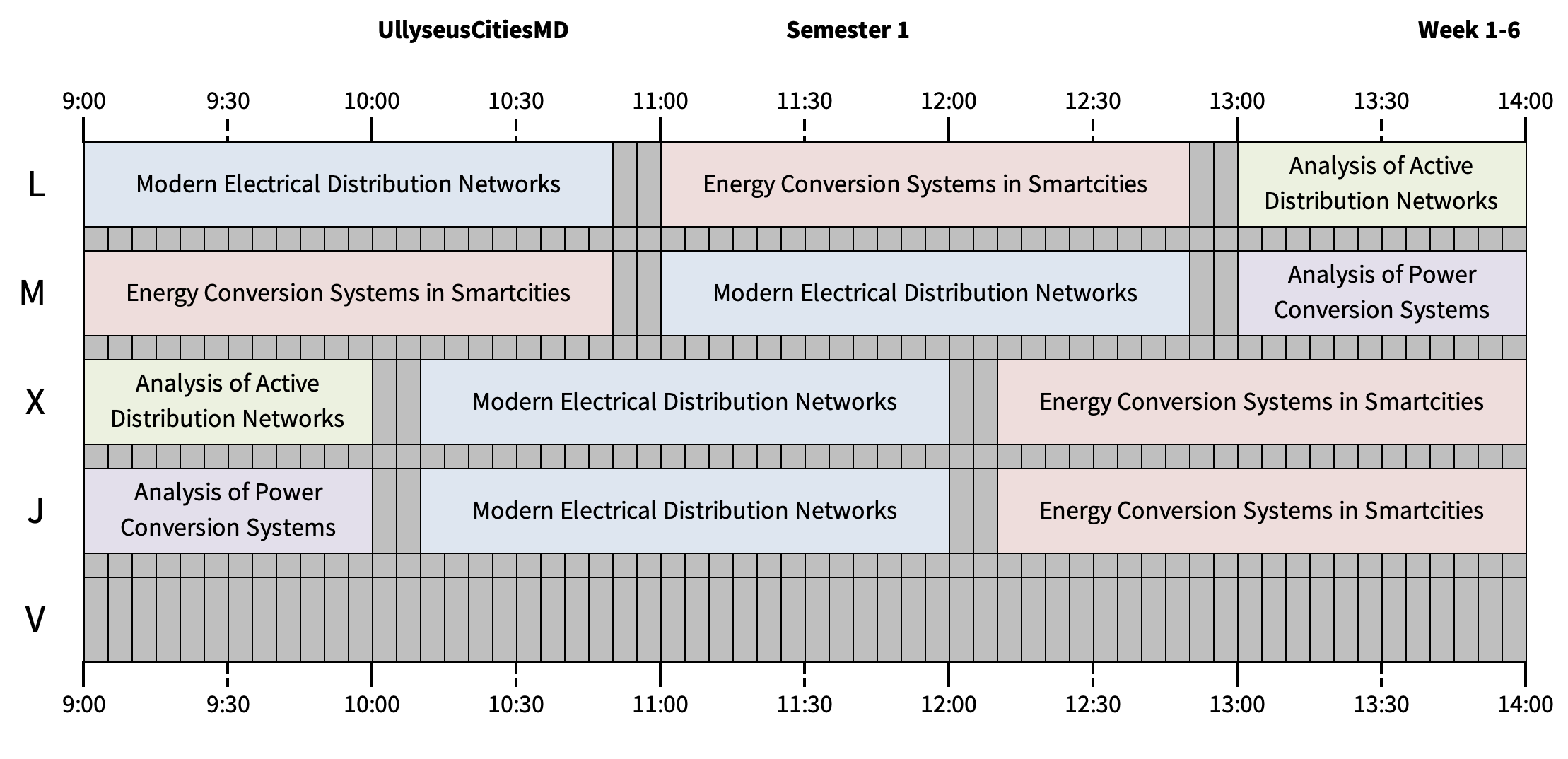
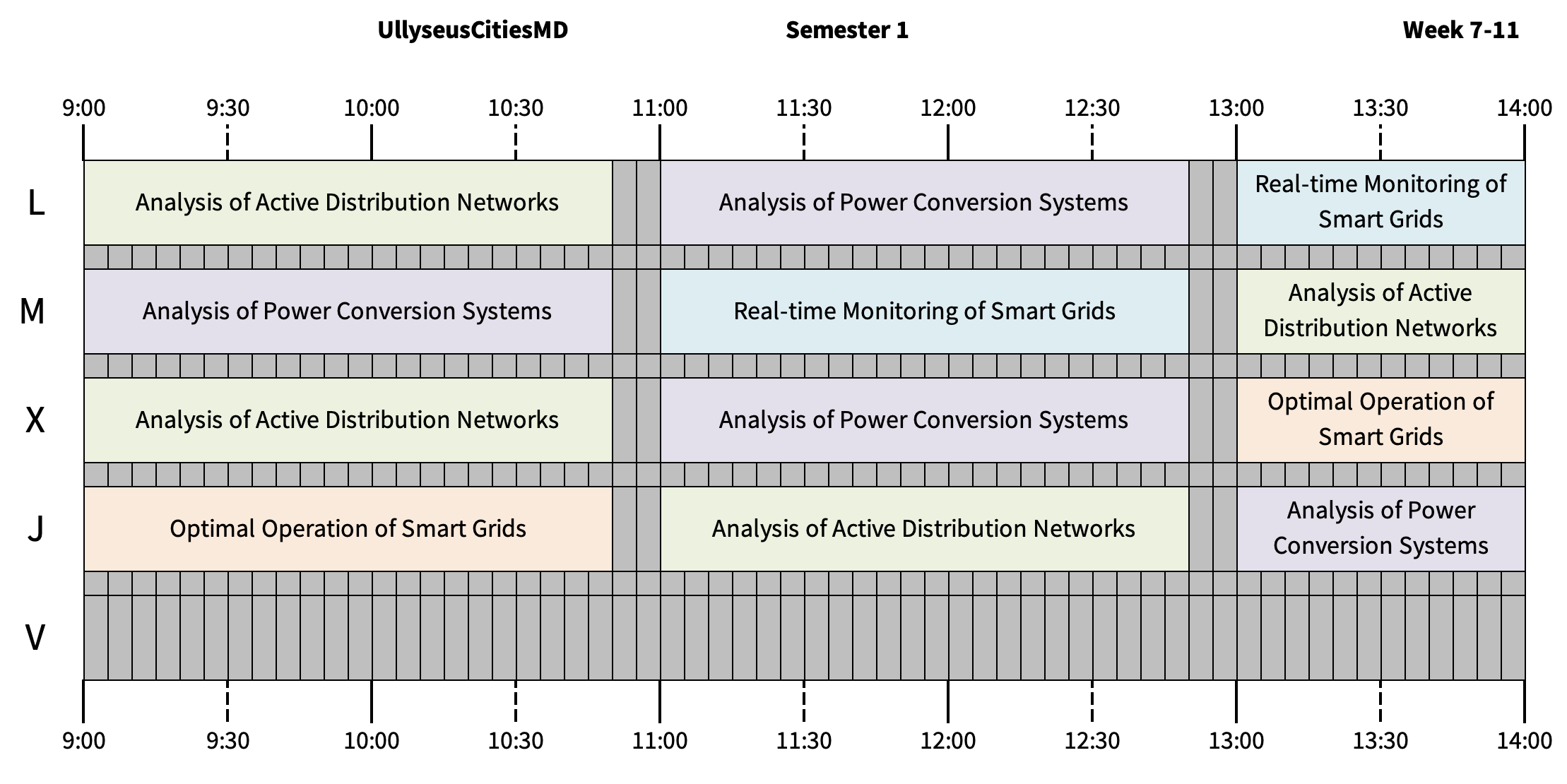
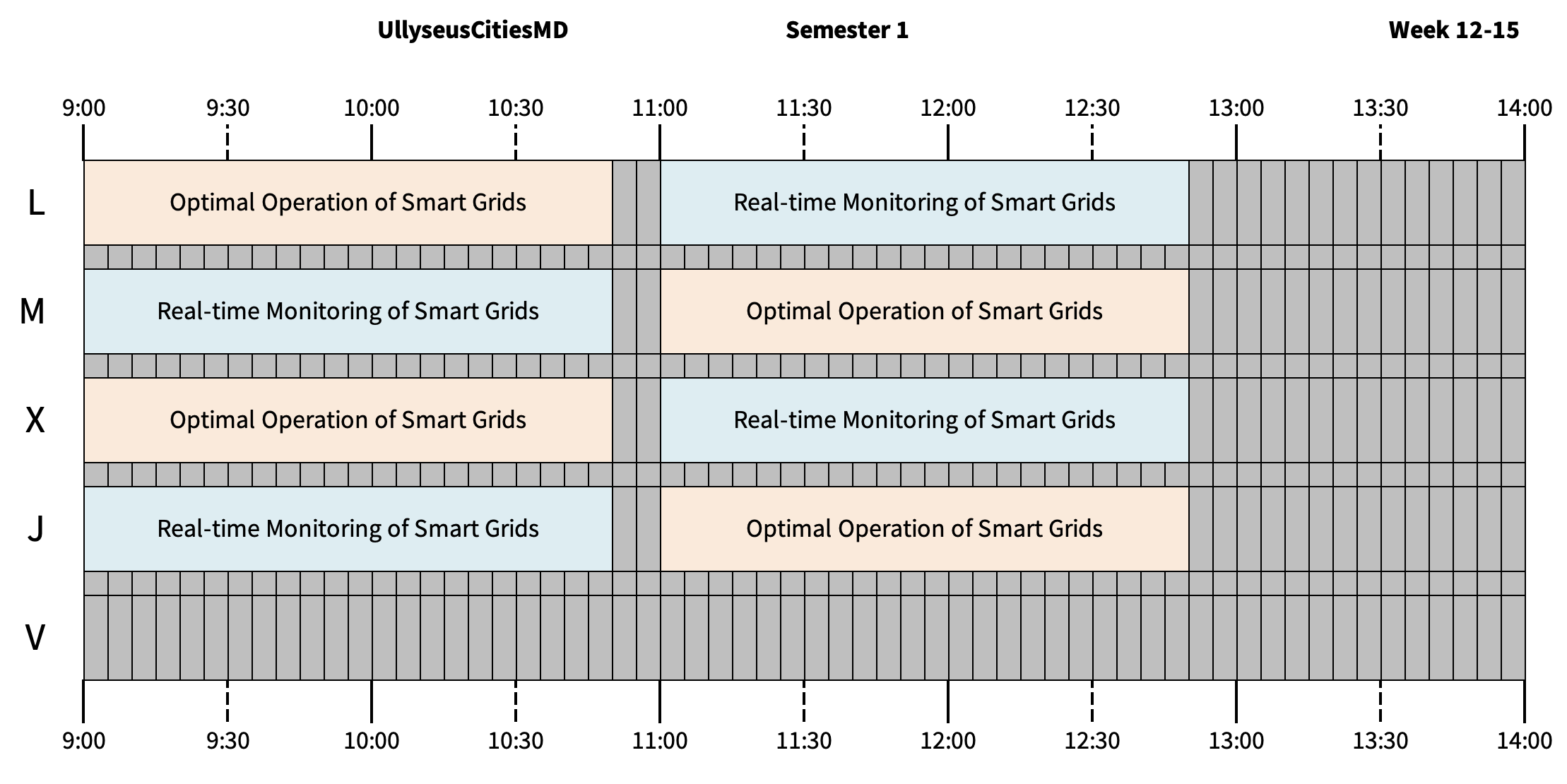
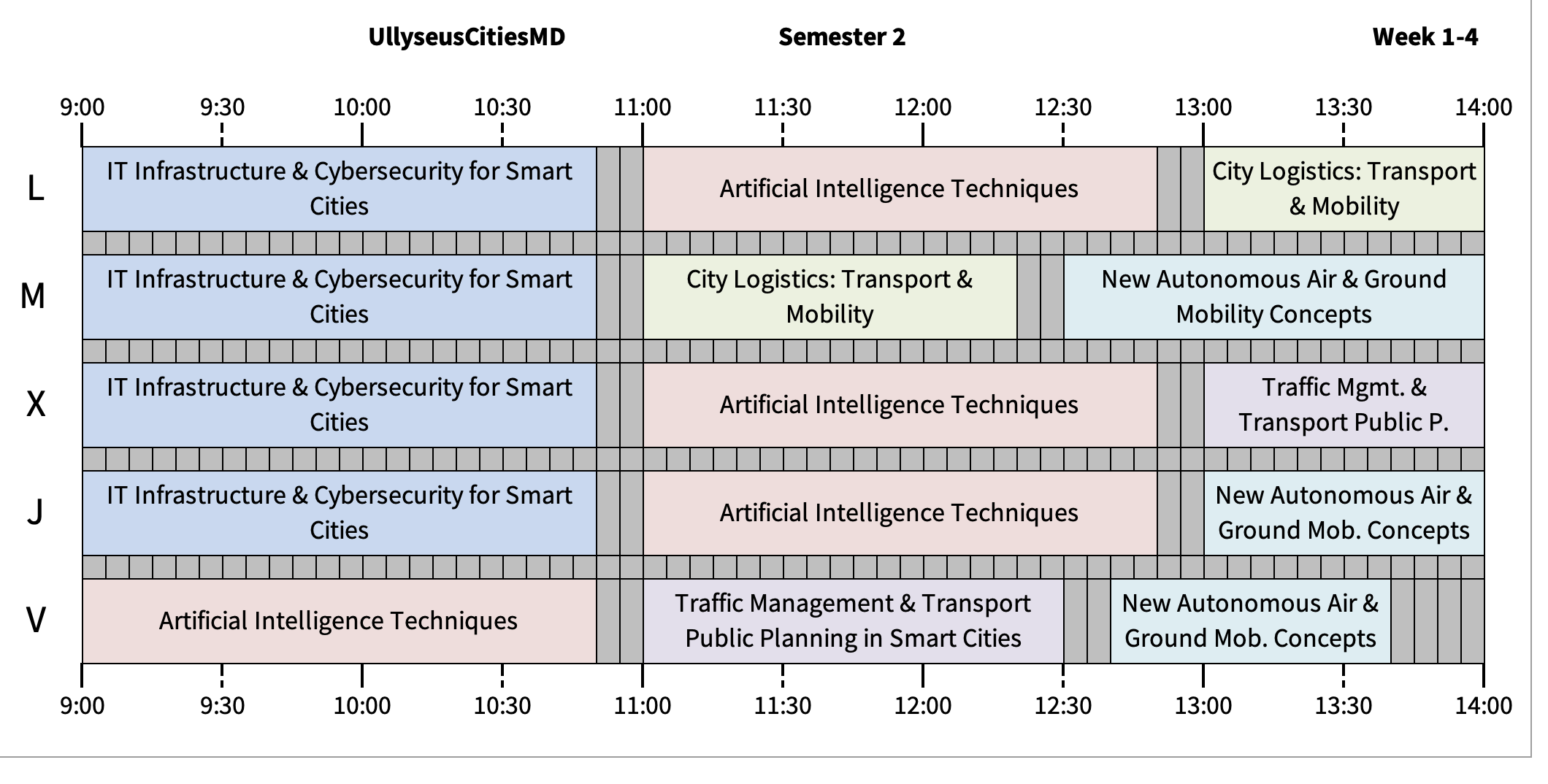
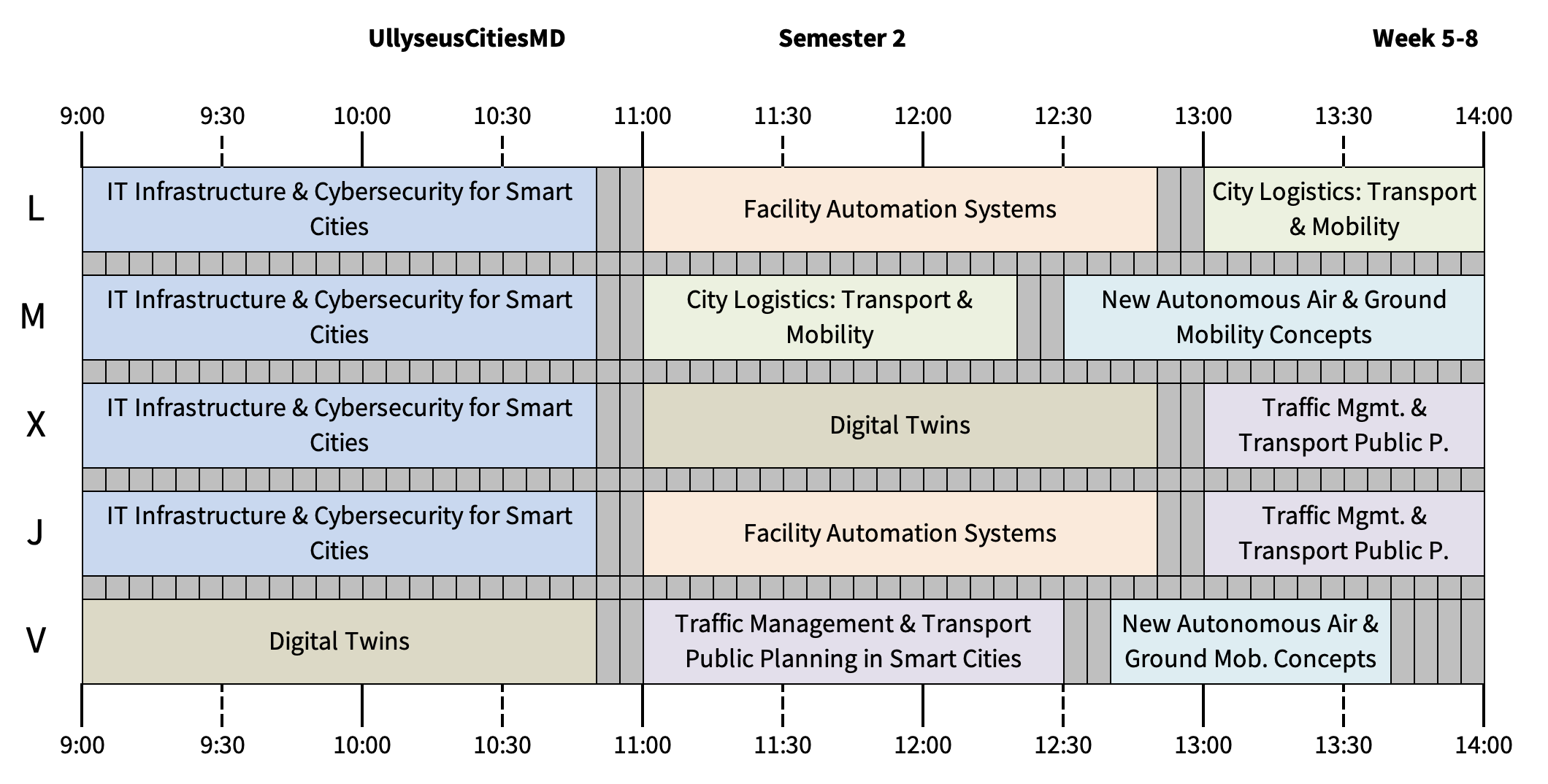
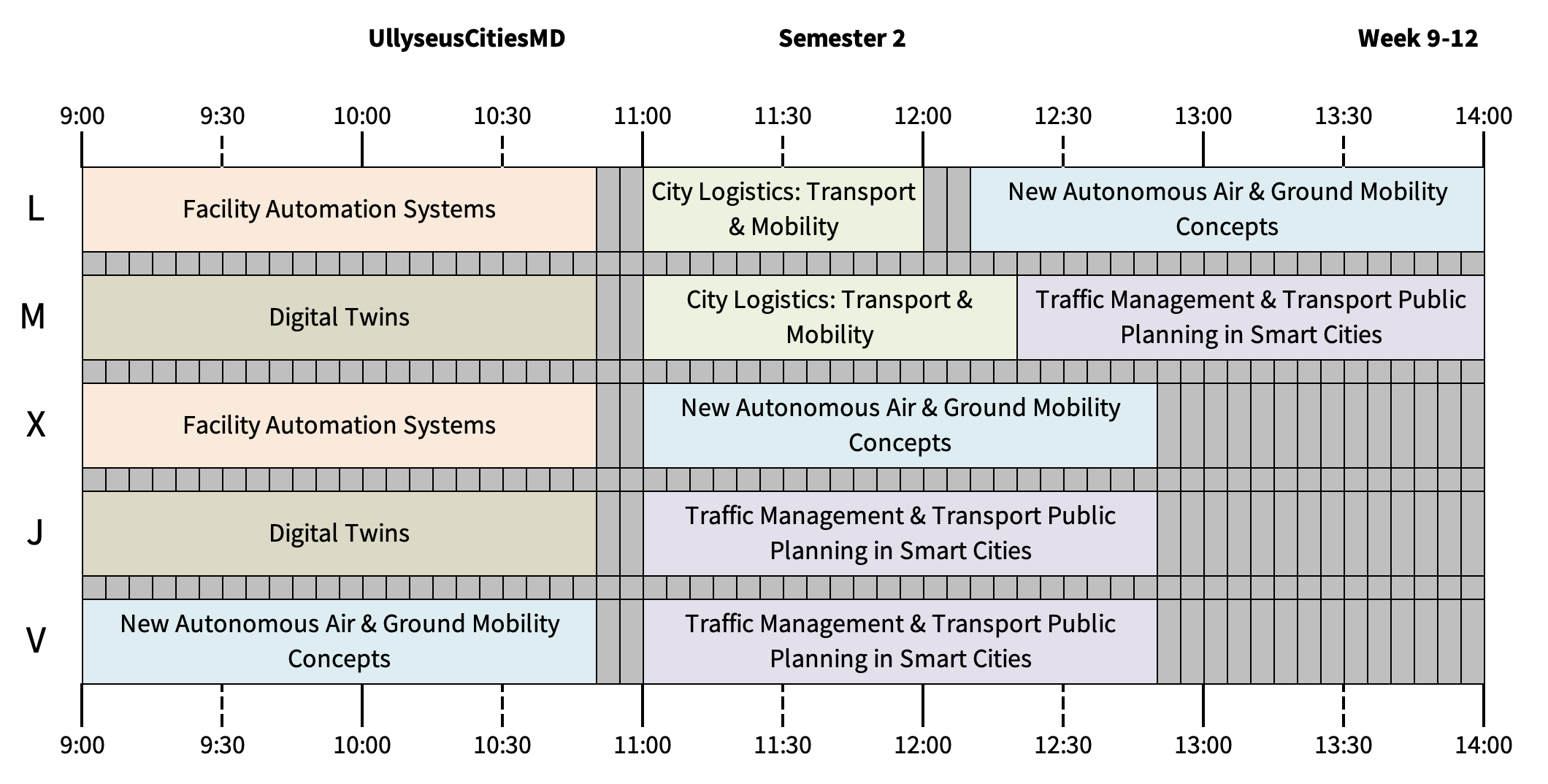
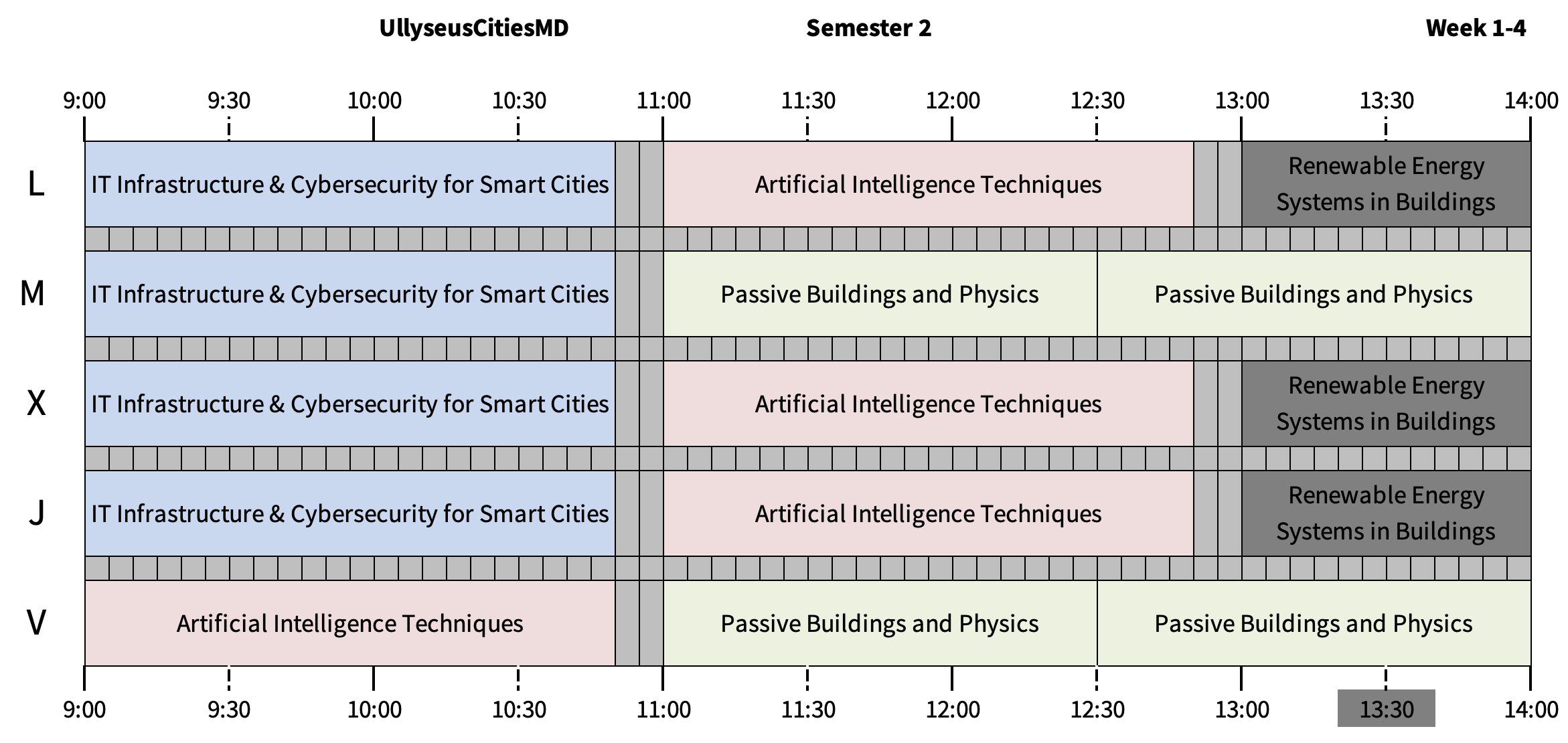
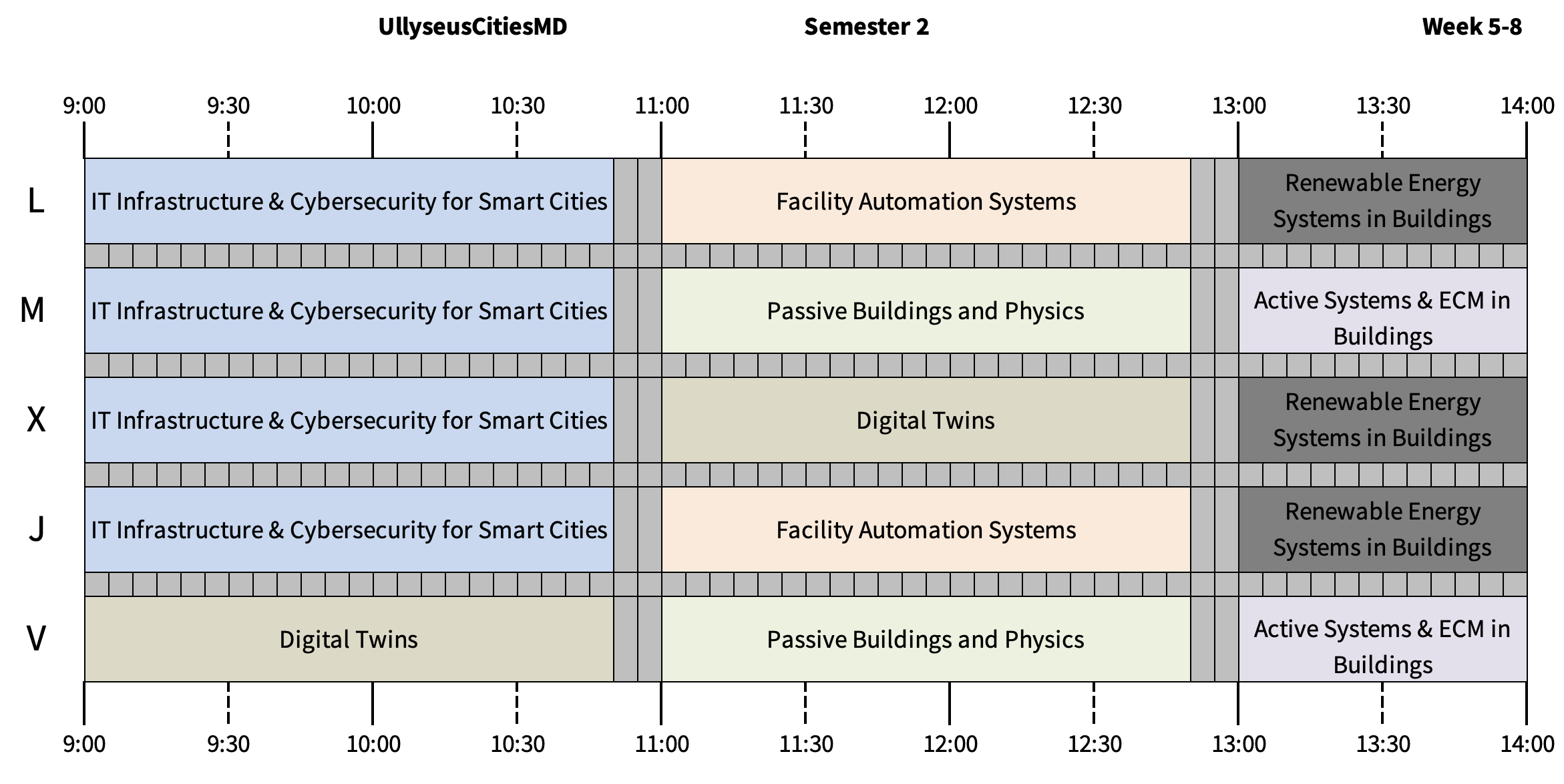
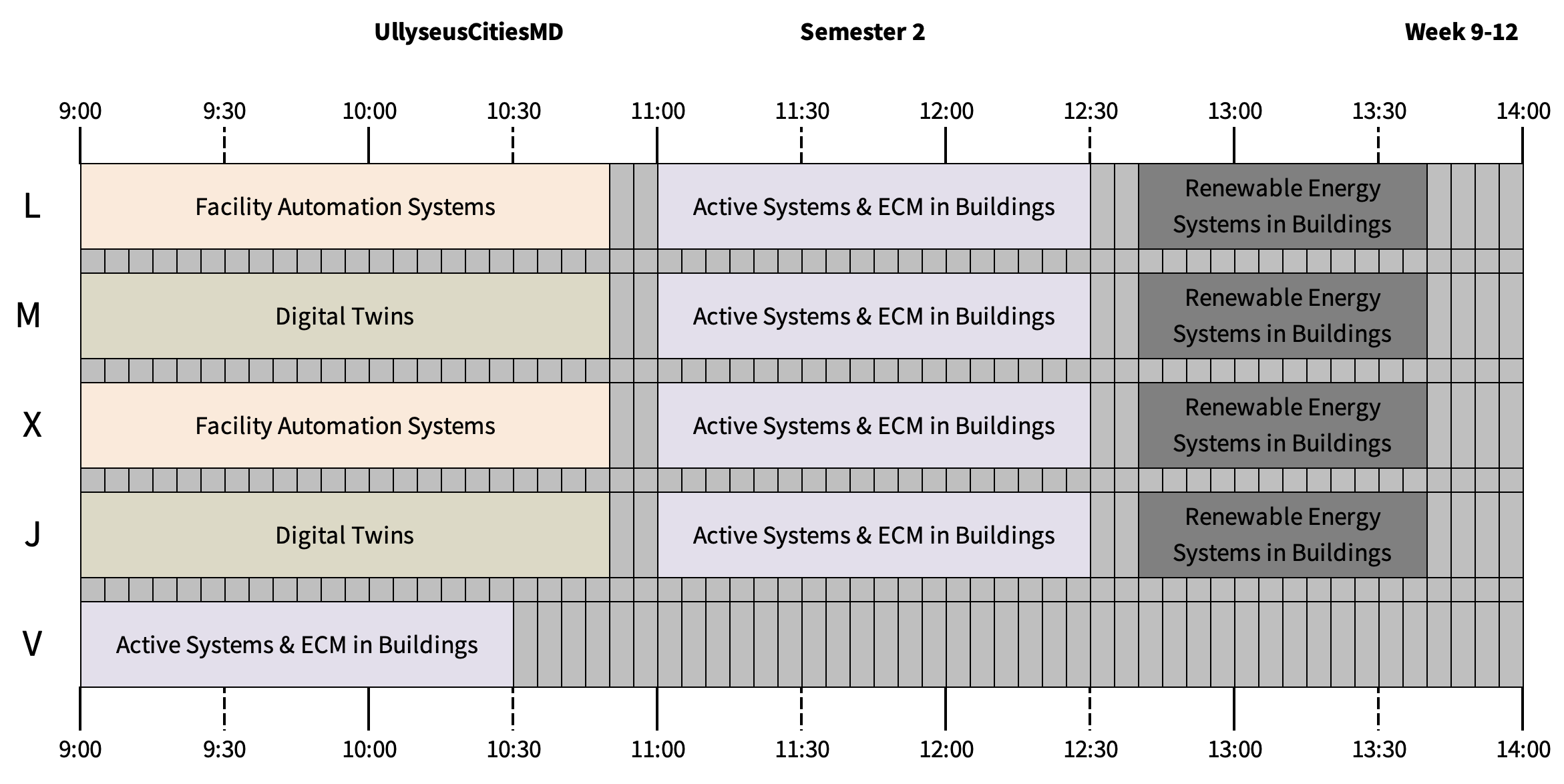
Additional training of Ulysseus
Did you know that as a Ulysseus student you have access to tons of free short courses? From languages and entrepreneurship to AI, digital skills, sustainability, and more — there’s something for everyone! It’s a great chance to learn from experts, boost your CV, and connect with students from all over Europe. Don’t miss out — explore the courses and start learning today!
